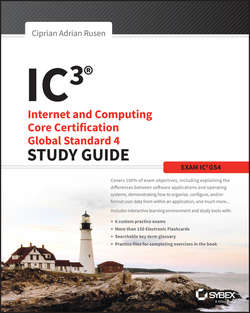Читать книгу IC3: Internet and Computing Core Certification Global Standard 4 Study Guide - Ciprian Adrian Rusen - Страница 6
На сайте Литреса книга снята с продажи.
Introduction
Answers to Assessment Test
ОглавлениеIC3 – Module 1: Computing Fundamentals
1. D. The keyboard shortcut for Copy is Ctrl+C.
2. C. Android is the only operating system in the list.
3. A, B. Modern operating systems execute applications and commands in real time, and they allow multiple applications to run at the same time (multitasking).
4. D. The Clipboard holds information temporarily until you opt to paste it somewhere else.
5. C. Windows Update is a tool that keeps Windows up to date.
6. C. The processor is the “brains” of a computer. The CPU is what carries out the instructions sent by the software you run.
7. D. Peripherals are external hardware components that can be connected to a computer.
8. B. A laptop is a portable computer that is suitable for mobile use.
9. B. The amount of storage space is measured in bytes and its multiples. Modern computers tend to have large hard drives with lots of storage space. It is very common to have a hard disk in your computer with 500 GB of storage space or even 1 TB.
10. C. Open source is a type of software license.
11. D. The most popular examples of presentation programs are Microsoft PowerPoint (included in Microsoft Office) and Impress (included in LibreOffice).
12. B, D. Personal entertainment applications allow you to do fun things on your computer, like listening to music or watching movies.
13. C. Task Manager shows a list of all the applications that are running on your computer.
14. C. Firmware is a very basic piece of software that contains only the instructions that are required for the hardware to work as intended. It is the first software to run on a device when it is powered on.
15. D. Safe Mode is a different way of starting Windows that loads only the barest essentials that are required for Windows to function.
IC3 – Module 2: Key Applications
1. C. You can press Alt+F4 on your keyboard to close any application.
2. A. Browse your computer using Windows Explorer and double-click the file that you want to open.
3. C. When you use the spell checker in Microsoft Office, each mistake is highlighted, and one or more solutions are suggested for fixing it.
4. D. You can access the printing options by pressing Ctrl+P on your keyboard.
5. A. Select all the text in a document by pressing Ctrl+A on your keyboard.
6. B, C. In Microsoft Word you can create bulleted, numbered, and multilevel lists.
7. D. You cannot add page numbers on the ribbon; they need to be added in the pages of a document.
8. B. Press Tab on your keyboard to move to the next cell.
9. C. The formula bar is labeled with the function symbol (fx).
10. D. You add a new slide by pressing Ctrl+M on your keyboard.
11. A. Microsoft PowerPoint offers table styles that can be used to quickly change the looks of your tables.
12. B. You can set transitions, which are similar to animations, to slides, but they affect only what happens when moving from one slide to the next.
13. A. Databases are organized collections of data.
14. D. Microsoft Access was designed to access, use, and manage databases.
15. C. When Track Changes is turned on, all the changes that are made to the document are kept and can be viewed at any time, as long as no one deactivates this feature.
IC3 – Module 3: Living Online
1. C. WWW is an abbreviation for World Wide Web.
2. B. The Web, or the World Wide Web, is a system of websites connected by links.
3. D. http://www.microsoft.com/ is an example of a URL.
4. A. Internet Explorer is a web browser.
5. B. You can set a website as a favorite and create a link that you can use to access it quickly later on.
6. A. LAN is an abbreviation for local area network.
7. D. The Internet is an example of a WAN.
8. A. The ping tool allows you to test the connection between two devices on the network.
9. D. John.Smith@example.com is an example of an email address.
10. C. Skype is an example of an application that can be used for both audio- and videoconferencing.
11. B. Facebook is a social network.
12. D. ☹ is an emoticon.
13. A. Piracy is the whole phenomenon of copyright infringement.
14. C. Del or Delete is the keyboard shortcut for deleting files.
15. D. Search operators are words that can be added to searches to help narrow down your results.
